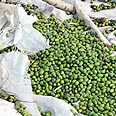
West Bank: Left activists shield olive harvest
Ynet joins group of leftist activists who took a few days off from work to act as human shields for Palestinians during olive gathering, as well as help out with the harvest
This week, Ynet joined a group of leftist activists who decided to take a few days off from work to act as human shields for Palestinians during olive gathering, as well as help out with the harvest.
On our way to Farata, a village close to Nablus and the Havat Gilad outpost, the activists tell hair-raising stories about the settlers. Each one has had their own traumatic experience with them, whether it involves stoning, beatings, or foul language.
Still, the activists emphasize that it is only a small, yet dangerous minority, and that “there are usually no problems with most settlers”.
Although the olive industry in the West Bank is the livelihood for thousands of families and has great economic importance, the primary struggle is over the land. Palestinians view the olive tree as proof of their ownership of the land, while settlers for the most part disagree.
As we enter the village and leave the bus, the activists move forward as one through the thorn field towards the olive grove, armed with cameras and ready to document any injustice.
It’s as if the settlers are viewed as some sort of demons that could pop up from behind a tree at any given moment.
After meeting with the Palestinians by the grove, they proceed to tell the leftist activists story after story of the various of harassment they have suffered in recent years – stories of olive looting, tree destruction and uprooting, and even physical violence.
Confrontations
The Palestinians say that this year was relatively calmer than others.The Tuesday before we arrived at Farata, verbal confrontations between Palestinians and settlers were reported there. The army separated the two groups and took the opportunity to declare that leftist activists would not be allowed in the groves during the harvest in order to keep things calm.
The relationship between the leftist activist and the army and police is complex. Sometimes it seems like a game of cat and mouse, with the army declaring the harvest area as closed military territory, and the leftist activists waiting for them to leave and going right back in to the groves.
Other times, negotiations between various leftist activist representatives and IDF officials end up being settled with the activists remaining in the groves and the army “turning a blind eye”.
“The best way we can help Israel is to help the Palestinians. It is a moral issue, against the injustices of the occupation,” explains Physics doctor David Nir.
Ascherman: I want to give people hope
While the activists pick olives they are joined by Rabbi Arik Ascherman, director of Rabbis for Human Rights. The colorful character, dressed in a shirt that declares “I am religious, not orange,” is well-like by the organization’s secular activists. “He looks just like King David,” says one of them.
Ascherman, a one-man operations room, lends a sympathetic ear to Palestinians, and manages to maneuver around the army too. He still tries to convince settlers of the justice of his path, but they would rather take off his kippah, sometimes by force. “Through our activity, I want to give people back hope,” Ascherman says, “which may still be peace.”
This time the settlers don’t show, and the activists show signs of tiredness after hours of swatting and collecting olives. Then, as they are almost through, the real action starts: Buying oil and olives from one of the orchard’s owners, Ibrahim Salah. Wallets are pulled out, and the atmosphere is almost like at a Duty Free shop, before returning to Israel; almost everyone leaves stocked with freshly pressed olive oil.
Just a few hours after we leave, Rabbi Ascherman informs us painfully that an orchard right next to where we were was set on fire. In Havat Gilad, the illegal outpost opposite, settlers claimed the fire was ignited when IDF lighting equipment ignited. The army knew nothing of the incident.
For his part, Itai Zar, a settler from Havat Gilad, viewed the activists as disrupting the peace: “These Left-wing activists are evil. They want to help the enemy. The shoot at us, murder us, and any normal nation who came under attack like this – would put a stop to it. And now, the army and the police are protecting them from us?! The army and the High Court are forfeiting our lives, while in these villages they support Hizbullah and reconnoitering us.”










